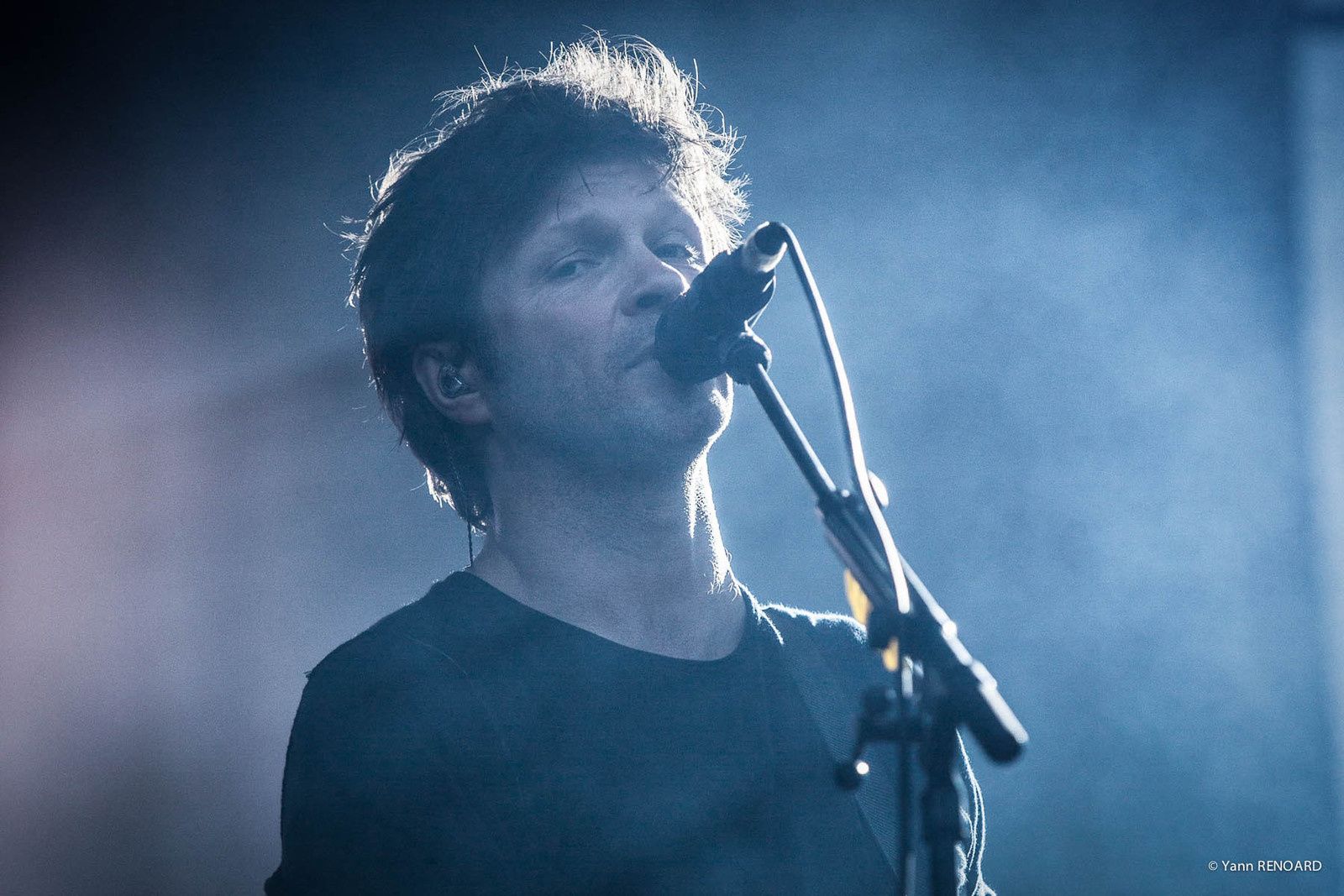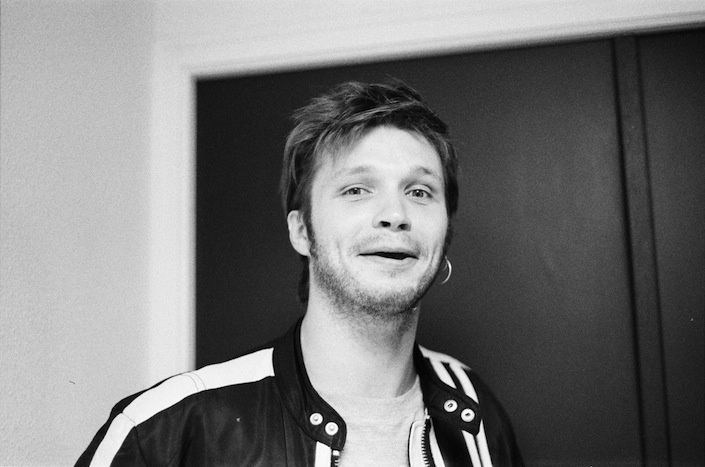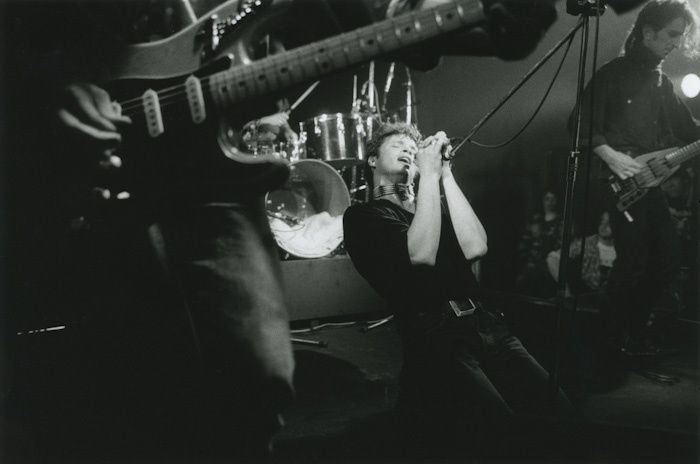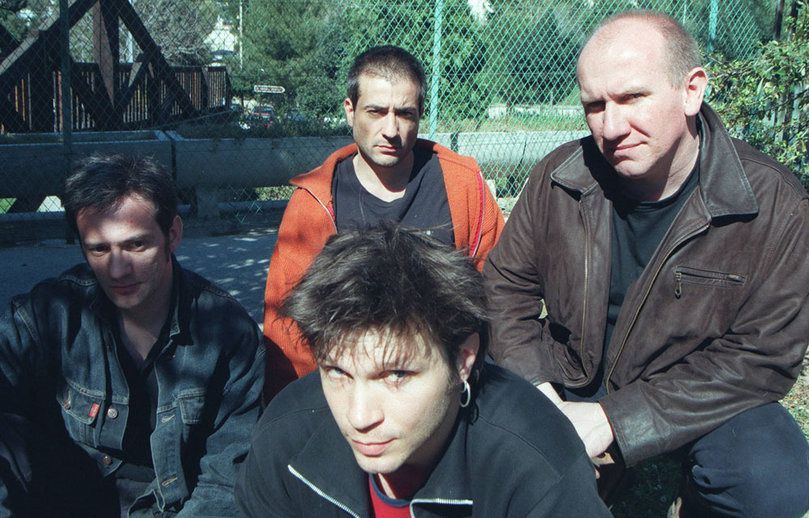Happy birthday, Bertrand Cantat
Happy birthday, Bertrand Cantat...
Born on March 5 1964 in Pau, France, Bertrand Cantat is a singer, musician and songwritter best known as the singer, lyricist and a founding member of Noir Désir.
When Bertrand was a child, his parents wanted their children to be more focused on reading and played only very few music, essentially classical music and chanson singers like Georges Brassens and Jacques Brel. He began to be interrested in music at the age of eleven, after listening to MC5, and, when he was 13, he began to listen to the Doors and to write texts.
The arrival of punk rock music in France made Bertrand want to play in a band. Jeffrey Lee Pierce's The Gun Club then became one of his favourite bands.
When he was 16, Bertrand met Serge Teyssot-Gay in high school, and, through an ad, the two later met Denis Barthe and Frédéric Vialenc and decided to form a band (lineup: Bertrand Cantat (vocals), Serge Teyssot-Gay (guitar), Frédéric Vidalenc (bass), Denis Barthe (drums)). Back then, Bertrand did not know how to play any instrument, that is why he decided to try to sing. The band, originally called Psychoz, won a rock contest organized by the channel FR3. They later changed their name to 6.35 and then to Noirs Désirs.
Between 1981 and 1984, the band played in bars in Bordeaux, especially at the Chat Bleu.
In 1986, Noirs Désirs recorded their first material, a 6 track tape. After hearing the tape and seeing them perform at the Jimmy in Bordeaux, Théo Hakola introduced them to the CEO of Barclay who then decided to sign them under the name Noir Désir for a one year renewable contract.
Noir Désir's debut album, Où veux-tu qu'je r'garde, produced by Théo Hakola, was released in 1987. Although it was short, the album already gave a clear idea of what type of band Noir Désir was with the rebel sounding song La Rage, and the song Toujours être ailleurs reflecting the unhappiness that was a well known feature of poets like Charles Baudelaire and Arthur Rimbaud.
5,000 copies of the album were sold and the release was followed by a tour of France.
The following year, their contract with Barclay renewed, Noir Désir headed to Brussels to record their second album. Veuillez rendre l'âme (à qui elle appartient) and its first single Aux sombres héros de l'amer, both released in January 1989, gave the band its first breakthrough. The release of the album was followed by a tour going through France, Canada, Czechoslovakia, and USSR. During this tour, Bertrand damaged his vocal cords, and even suffered of syncope on stage in Besançon, France.
In February 1991, the band released the album Du ciment sous les plaines and toured until July 1991 to promote the album. It was during this tour that the first tensions between the members began to emerge.
Exhausted and suffering from his vocal cords, Bertand decided to put Noir Désir on a break and went to spend some time in Mexico.
While in Mexico, he found the inspiration to write Noir Désir's next album, Tostaky.
Released in 1992, Tostaky was a commercial success and 350,000 copies of the album were sold although it had been bashed by two very influential music critics. While on tour to promote the album, the band recorded the live album Dies irae (which means Day of Anger in Latin) which was released in 1994.
After the end the tour, Bertrand had to undergo vocal cords surgery. Tensions between the band members had risen and the band decided to take a two year long break, which was followed by the departure of bassist Frédéric Vidalenc (replaced by Jean-Paul Roy) and of Jean-Marc Gouaux, who had been the band manager since 1992.
Noir Désir reunited in August 1996 to begin working on their next album, 666.667 Club, which was released in November the same year. The album became the most successful album by the band at the time and was certified double platinum in France. The tour promoting the album was followed by another vocal cords surgery for Bertrand.
In 1998, Noir Désir released a remix album called One Trip/One Noise.
The band's last album, Des Visages, Des Figures, was released in September 2001, and was certified double platinum in France after a few months. The following year, Noir Désir received the Victoire de la musique (accolade delivered by the French Ministry of Culture) of the Rock Album of the year.
On July 27 2003, in Vilnius, Lithuania, during a dispute with his lover Marie Trintignant, Bertrand hit her several times. She fell into a coma and died on August 1 2003.
Bertrand was sentenced by Lituanian justice to 8 years of prison for "murder committed with indeterminate indirect intention" on March 29 2004. On September 28 2004, he was transfered to a jail near Toulouse, France.
In October 2007, Bertrand was granted parole due to his good behavior.
On hiatus from 2003 to 2008, Noir Désir released two tracks, Gagnants/Perdants and a cover of Le Temps des cerises, on free download on their website on November 12 2008.
Bertrand made his return on stage on October 2 2010 at the festival Les Rendez-vous de Terres Neuves in Bègles, France, during which he joined the band Eiffel for three songs.
Noir Désir's final song was a cover of Alain Bashung's Aucun Express which was featured on the tribute album Tels Alain Bashung released in 2011.
In November 2010, Denis Barthe announced the split up of Noir Désir after the departure of Serge Teyssot-Gay.
In 2011, Bertrand recorded the song Palabra mi Amor with the band Shaka Ponk for their album The Geeks and the Jerkin' Socks. He also joined them on stage in Paris on November 25 2011 to perform the song and a cover of John Lennon's Instant Karma.
The same year, he participated to the composition of the album Choeurs, which featured 17 songs which accompanied the adaptation of three of Sophocles' tragedies by Wajdi Mouawad.
In 2013, with bassist Pascal Humbert, Bertrand formed the band Detroit. Their debut album, Horizons, was released in November 2013.
The following year, they released the double live album La Cigale which featured songs by Detroit as well as Noir Désir songs.
To conclude, we wish a happy birthday and years of rock to Bertrand Cantat!
[ french version :
Joyeux anniversaire, Bertrand Cantat...
Né le 5 mars 1964 à Pau, France, Bertrand Cantat est un chanteur, musicien et auteur-compositeur mieux connu en tant que chanteur, parolier et un des membres fondateurs de Noir Désir.
Alors que Bertrand est enfant, ses parents préfèrent que leurs enfants se concentrent sur la lecture et ne passent que très peu de musique à part de la musique classique et des chansons de Georges Brassens et Jacques Brel. Il commence à s'intéresser à la musique à l'age de onze ans, après avoir écouté MC5, et, à 13 ans, il commence à écouter les Doors et à écrire des textes.
L'arrivée du punk rock en France donne à Bertrand l'envie de jouer dans un groupe. Le groupe de Jeffrey Lee Pierce, The Gun Club, devient alors un de ses groupes préférés.
Quand il a 16 ans, Bertrand rencontre Serge Teyssot-Gay au lycée, et, grâce à une petite annonce, les deux rencontrent plus tard Denis Barthe et Frédéric Vialenc et décide de former un groupe (lineup : Bertrand Cantat (chant), Serge Teyssot-Gay (guitare), Frédéric Vidalenc (basse), Denis Barthe (batterie)). Alors, Bertrand ne sait jouer d'aucun instrument, c'est pourquoi il décide d'essayer de chanter. Le groupe, à l'origine appelé Psychoz, gagne un tremplin rock organisé par FR3. Ils changent plus tard leur nom pour 6.35 puis pour Noirs Désirs.
Entre 1981 et 1984, le groupe joue dans des bars à Bordeaux, particulièrement au Chat Bleu.
En 1986, Noirs Désirs enregistrent leurs premières chansons, une cassette de 6 pistes. Après avoir entendu la cassette et les avoir vu joué au Jimmy à Bordeaux, Théo Hakola les présente au directeur de Barclay qui décide alors de leur faire signé un contrat renouvelabke d'un an sous le nom Noir Désir.
Le premier album de Noir Désir, Où veux-tu qu'je r'garde, produit par Théo Hakola, sort en 1987. Bien que court, l'album donne déjà une idée de ce que sera le style de Noir Désir avec la chanson rebelle La Rage, et la chanson Toujours être ailleurs, qui reflète le mal-être caractéristique des poètes tels que Charles Baudelaire et Arthur Rimbaud.
5 000 copies de l'album sont vendues et la sortie est suivie d'une tournée en France.
L'année suivante, leur contrat avec Barclay renouvelé, Noir Désir se rendent à Bruxelles pour enregistrer leur deuxième album. Veuillez rendre l'âme (à qui elle appartient) et son premier single Aux sombres héros de l'amer, tous deux sortis en janvier 1989, donnent au groupe son premier succès commercial. La sortie de l'album est suivie d'une tournée passant par la France, le Canada, la Tchéchoslovaquie, et l'URSS. Durant cette tournée, Bertrand s'abime les cordes vocales, et souffre même de syncope sur scène à Besançon, France.
En février 1991, le groupe sort l'album Du ciment sous les plaines et tournent jusqu'en juillet 1991 pour promouvoir l'album. C'est durant cette tournée que les premières tensions entre les membres du groupe commencent à apapraître.
Epuisé et souffrant des cordes vocales, Bertand décide de mettre Noir Désir en pause et part quelques temps au Mexique. C'est là-bas qu'il trouve l'inspiration d'écrire le prochain album de Noir Désir, Tostaky.
Sorti en 1992, Tostaky est un succès commercial et 350 000 copies sont vendues bien que l'album ait été durement critiqué par deux critiques musicaux assez influents. Pendant la tournée promouvant l'album, le groupe enregistre le live album Dies irae (qui signifie Jour de Colère en latin) qui sorte en 1994.
Après la fin de la tournée, Bertrand doit se faire opérer des cordes vocales. Les tensions entre les membres du groupe ont grandi et le groupe décide de faire une pause de deux ans, qui est suivie par le départ du bassiste Frédéric Vidalenc (remplacé par Jean-Paul Roy) et de Jean-Marc Gouaux, manager du groupe depuis 1992.
Noir Désir se réunit en août 1996 pour commencer à travailler sur leur prochain album, 666.667 Club, qui sort en novembre de la même année. L'album devient l'album du groupe ayant connu le plus de succès jusque là et est certifié double disque de platine en France. La tournée promouvant l'album est suivie d'une autre opération des cordes vocales pour Bertrand.
En 1998, Noir Désir sortent un album de remix appelé One Trip/One Noise.
Le dernier album du groupe, Des Visages, Des Figures, sort en septembre 2001 et est certifié double disque de platine en France après quelques mois. L'année suivante, Noir Désir reçoivent la Victoire de la musique de l'Album Rock de l'année.
Le 27 juillet 2003, à Vilnius, Lituanie, pendant une dispute avec son amante Marie Trintignant, Bertrand la frappe plusieurs fois. Elle tombe dans le coma et meurt le 1 août 2003.
Betrand est condamné par la justiec lituanienne à 8 ans de prison pour "meurtre commis en cas d'intention indirecte indéterminée" le 29 mars 2004. Le 28 septembre 2004, il est transféré dans une prison près de Toulouse, France.
En octobre 2007, Bertrand obtient une liberté conditionnelle pour bonne conduite.
En pause de 2003 à 2008, Noir Désir sortent deux chansons, Gagnants/Perdants et une reprise de Le Temps des cerises, en téléchargement gratuit sur leur site le 12 novembre 2008.
Bertrand fait son retour sur scène le 2 octobre 2010 au festival Les Rendez-vous de Terres Neuves à Bègles, France, durant lequel il rejoint sur scène le groupe Eiffel pour trois chansons.
La dernière chanson de Noir Désir est une reprise d'Aucun Express d'Alain Bashung sur l'album hommage Tels Alain Bashung qui sort en 2011.
En novembre 2010, Denis Barthe annonce la séparation de Noir Désir après le départ de Serge Teyssot-Gay.
En 2011, Bertand enregistre la chanson Palabra mi Amor avec le groupe Shaka Ponk piur leur album The Geeks and the Jerkin' Socks. Il les rejoint aussi sur scène à Paris le 25 novembre 2011 pour jouer la chanson ainsi qu'une reprise d'Instant Karma de John Lennon.
La même année, il participe à la composition de l'album Choeurs, qui comporte 17 chansons qui accompagnent l'adaptation de trois tragédies de Sophocle par Wajdi Mouawad.
En 2013, avec le bassiste Pascal Humbert, Bertrand forme le groupe Detroit. Leur premier album, Horizons, sort en novembre 2013.
L'année suivante, ils sortent le double live album La Cigale qui comporte des chansons de Detroit et des chansons de Noir Désir.
Pour conclure, nous souhaitons un heureux anniversaire et des années de rock à Bertrand Cantat ! ]
found and shared for you by your blog classic rock stars birthdays
about: trademarks, images and property
sources: Noir Desir official website |
parismatch.com |
memories.eurockeennes.fr |
sudouest.fr |
universalmusic.fr |
thestar.com |
alchetron.com |
renoard.fr |
shipinthesand.net |
memoires-de-trans.com |
ma-bimbo.com |
youtube.com |
Getty Images |
wikipedia

/image%2F0938550%2F20140220%2Fob_b6a3fa_cover-01.jpg)

















/image%2F0938550%2F20180423%2Fob_e3ceb3_steve-conte-01.jpg)
/image%2F0938550%2F20170523%2Fob_423109_lenny-kravitz-01.jpg)
/image%2F0938550%2F20170225%2Fob_87cc12_andrew-hunt-buffalo-summer-01.jpg)
/image%2F0938550%2F20160803%2Fob_3579df_mick-jagger-1982-the-rolling-stones-to.jpg)